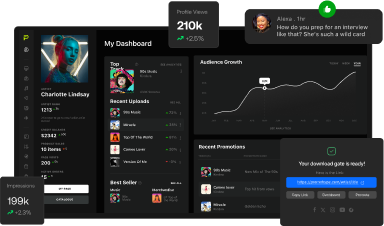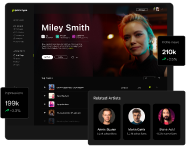
Breaking into the music industry has evolved dramatically in recent years, with new technologies and instant access to online audiences.
With affordable production tools and global distribution platforms, becoming a breakthrough act has never been easier.
This guide explains how the music industry operates, tracing its history and uncovering the key processes behind today’s career-defining trends.
Get Early Access
To Promo Hype
What Is The Music Industry?
The music industry encompasses individuals and organizations that create, produce, distribute, and promote music worldwide.
Covering the most popular music genres and niche subgenres, it has undergone significant developments over the decades.
These impact everything from how artists make music to the platforms the music industry uses to reach audiences.
In today’s digital environment, songwriters have multiple career options, from working as independent artists to signing with major labels.
A Brief History Of The Music Industry
Music has played a ubiquitous role in daily life for many centuries, but the concept of a music industry is relatively recent.
Following the early distribution of sheet music and live performances, technological advancements changed the landscape.
Thomas Edison’s phonograph, invented in 1877, gave birth to the recorded music industry, while radio distributed music to the masses.
In the post-World War II era, music distribution became widespread, with vinyl records dominating consumer markets until the 1980s.
As CDs gave way to digital music files and streaming platforms, the relationship between artists and fans has become increasingly democratized.
Taken together, these important musical moments have shaped the evolution and business models of record companies.
Recommended reading: Top 10 record labels looking for artists.
Key Music Industry Roles
Music industry professionals handle everything from fostering creative development to managing the production and distribution of releases.
Here’s an overview of the key music industry roles and how these correspond to singer-songwriters, musicians, and producers.
Artist & Creative Roles
At the heart of the music industry lies the creativity of songwriters and musicians, composing works with commercial or niche appeal.
In addition to knowing how to write a song, artists can attract and build a fan base by crafting a persona that matches their musical style.
This persona is honed through careful branding and marketing, with on-stage charisma during live performances strengthening fan engagement.
In some cases, songwriters and producers work behind the scenes, arranging song structures and engineering music for other artists.
Music Business Roles
The music industry is a business model like any other, with multiple roles dedicated to making money from music created by artists.
Talent managers, publicists, and music marketing professionals in the industry play a crucial role in shaping artists’ careers, ultimately driving record sales.
Revenue generated through digital downloads, physical sales, and licensing is distributed as music royalties to artists, labels, and publishers.
Music professionals, such as booking agents and tour managers, are also on hand to promote upcoming live performances and tours for signed artists.
Technical & Production Roles
The music industry encompasses many interrelated roles behind the scenes, including technical aspects like music mixing.
This can range from running recording studios to working as a sound engineer during live performances, managing audio equipment.
Record labels often provide a dedicated music producer to work with singers and bands to create a unique sound.
Professionals in the music industry also provide mixing and mastering services to polish productions before release.
How The Music Industry Works: 10 Key Elements
Understanding the role of core players requires an overview of the key elements that drive the music industry.
Let’s explore these elements in more detail and how musicians and songwriters can leverage their skills to build successful music careers.
1. Recorded Music
The recording industry has been a core element of the music industry since its inception, transforming artistic visions into reality.
By recording music in professional studio facilities, artists can build a discography that connects with their fans.
This can range from short-term studio sessions for singles to lengthy projects creating EPs and albums with multiple tracks.
Music professionals working in this field are often highly trained, capable of reading sheet music and managing session musicians.
2. Music Production
Once the vocals and instruments for a song have been recorded, additional music production techniques are then applied.
Working with the best digital audio workstations, producers apply mixing and effects to refine and polish the recordings.
Reverb, chorus, and filters shape the song’s elements, while audio compression and other techniques create a unified overall sound.
Many of the best music producers collaborate with other musicians, playing a crucial role in helping them reach a wider audience.
Related read: How to make money as a music producer.
3. Artist Management
Bridging the gap between recording and production are artist management professionals, who facilitate artists’ career development.
Artist management teams work closely with talent to foster their creative development and achieve high-end career goals.
They also offer advice on contract negotiations with labels and music publishers to secure the best possible deals.
In some instances, artist management teams are involved in music promotion, creating marketing strategies and publicity campaigns.
It’s a broad yet flexible element of the music industry, oriented toward representing artists’ best interests and priorities.
4. Music Publishing
Another core element of the music industry that serves as a bridge between artists’ interests is music publishing companies.
Publishers manage song copyrights and collect royalties from uses such as streaming, downloads, and public performances.
They also help signed artists secure placements in movies and television shows, augmenting royalties with licensing deals.
Additional roles include general financial management, legal administration, and management of talent’s intellectual property.
Get Early Access
To Promo Hype
5. Record Labels
Equally embedded in the history and modern practices of the music industry are record labels, which also play various interrelated roles.
The music industry’s “Big Three” major labels — Universal Music Group, Sony Music Entertainment, and Warner Music Group — dominate the market.
Each of these labels owns hundreds of subsidiaries, including Def Jam, Interscope, RCA, and Atlantic Records.
While these labels cater to mainstream acts, many independent record labels also support smaller bands and solo artists.
Record labels use A&R (Artists and Repertoire) professionals to seek out new talent, then provide funding for recording studios and mixing services.
They’re also closely involved in building artists’ brands and overseeing the marketing and distribution of their latest releases.
By refining their image and building a strong music library, artists can get signed to a record label and develop their music careers.
6. Digital Music Distribution
The rapid acceleration of digital music production and distribution has created a fertile landscape for independent musicians to thrive.
Streaming platforms like Apple Music, Spotify, and TIDAL allow artists to reach international audiences with minimal effort.
This new digital environment also enables the sale of digital song downloads through websites such as Bandcamp.
While record labels assist signed acts in this capacity, independent musicians and artists don’t need a label to achieve results.
Thanks to music distribution services, new releases and back catalogs can be uploaded across multiple streaming platforms instantaneously.
This allows artists to retain most or all of their music royalties, depending on the platform’s specific terms.
By using analytics tools to monitor sales and listener demographics, distribution services deliver the maximum possible reach.
7. Live Music Performances
A traditional way for a singer-songwriter or band to make money is through live performances, such as one-off shows or tours.
The live performance sector has remained consistently fluid and dynamic, with enthusiastic support from dedicated music fans.
For the music industry, this involves many roles to connect artists with booking agents, venue owners, and event promoters.
Record labels and publishers assist with these processes, getting gigs for musicians and driving ticket sales through promotions.
Performing live music is equally crucial for building a strong reputation and fan base as it is for direct monetization.
By delivering immersive live experiences that showcase the artists’ charisma, concerts offer an unparalleled experience for fans.
Today, support for grassroots music venues is stronger than ever before, while virtual reality is creating opportunities for hybrid events.
8. Music Royalties
The collection and distribution of music royalties has been a driving factor in monetization since the early days of the music industry.
Representing payments to a song’s creators and other rights holders, royalties are generated from a wide range of uses.
Combined with other sources of income, such as ticket sales and merchandise, they’re vital for sustaining artists’ music careers.
Let’s break down the two main types of music royalties, and how they are collected and distributed:
- Performance royalties: As the name suggests, performance royalties are paid whenever music is performed publicly, such as in a venue or on a radio station. Collection of such royalties is handled in the United States by performance rights organizations such as ASCAP and BMI.
- Mechanical royalties: Income generated through the reproduction of music on physical formats and digital downloads is collected through mechanical royalties.
While royalty income varies, increases in royalty rates from terrestrial radio and other platforms add up to billions in annual revenue.
9. Sync Licensing
In addition to mechanical and performance royalties, artists and publishers can generate revenue through sync licensing deals.
A common form of music licensing, this legal agreement allows a third party to use music for various visual media projects.
Typically, sync licensing involves a particular song being used in a movie, TV show, commercial, or video game.
While landing a sync licensing deal can be challenging for independent musicians and artists, it can result in significant exposure.
Most sync licensing deals, however, are arranged through publishing companies, which have deep industry networks to draw from.
10. Music Promotion & Fan Engagement
With thousands of new artists emerging each year, marketing strategies have become essential for artists to succeed.
Artists, labels, and publishers all play a critical role in promotion, whether it’s low-budget fan outreach or major ad campaigns.
Independent artists don’t need extensive financial backing to build their reputation, with many music marketing tools available to help.
Developing band merchandise is another tried-and-tested method for engaging fans and using their support for promotion.
Just as music distribution has gone digital, so too can artists utilize online platforms to generate buzz and anticipation for upcoming releases.
A strong social media presence, combined with an excellent band website, can achieve impressive results with effective branding.
Learn more: What is an EPK?
Legal & Financial Considerations
As with any other major sector, the music industry is often shaped by legal and financial obligations that influence its operations.
Whether you’re considering starting a record label or signing a contract as an artist, understanding these legalities is essential.
Likewise, familiarity with the financial complexities of the music industry will ensure your revenue streams are fully optimized.
Here’s an overview of the primary legal and financial considerations involved in the music industry:
- Copyright ownership: Knowledge of music copyright laws is essential for artists, as it determines how royalties are shared and who owns the composition and sound recording rights.
- Music piracy: Related to copyright laws, piracy results in significant annual revenue losses for the music industry. Artists can access anti-piracy services, such as YouTube’s Content ID system, to flag violations of their creative works.
- Budgeting projects: While signed artists can access funding through record labels, indies can struggle to acquire and manage project finances. This can be overcome through music grants and accessing other resources that don’t require significant investments.
Other processes, such as trademarking a band name, are also critical for artists when breaking into the music industry.
How To Find Music Industry Jobs
There are plenty of employment opportunities within the music industry that cater to each individual’s unique skills and experience.
If you’re considering starting a music career, here’s some actionable advice to help you land your dream role:
- Focus on developing skills: When seeking employment in the music industry, a strong skill set is essential to stand out from the competition. This means honing your songwriting or production skills and attending music production schools to master your craft.
- Build industry networks: Networking online through platforms like LinkedIn, as well as at industry events, will allow you to forge connections and opportunities for landing music industry jobs.
- Acquire practical experience: Hands-on experience through internships and volunteering can also significantly boost your chances of getting noticed by the right people.
By building a strong portfolio and researching labels and publishers in your niche, you can transform your passion for music into a career.
Read this next: How to make money as an independent artist.
The Future Of The Music Industry
The music industry is in a constant state of flux, with new challenges and opportunities from artificial intelligence and other technologies.
While AI raises concerns about intellectual property theft, new AI music production tools can also streamline the creative process.
Such tools enable the production of music, lowering both the overall costs and barrier to entry for up-and-coming artists.
Understanding how these factors play a role will make it easier to navigate the music industry and realize your ambitions.
Summary
The music industry is constantly evolving, and opportunities for indie artists to reach a global audience have never been stronger.
Understanding how the music industry works enables you to make informed decisions that effectively leverage your creative skills.
By continually refining your songwriting and production methods, you can differentiate yourself from the competition and establish a sustainable music career.
Get Early Access
To Promo Hype
Join Promo Hype






